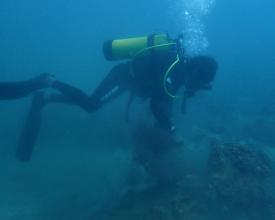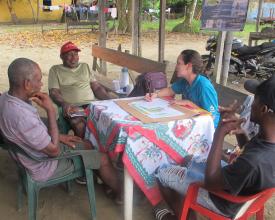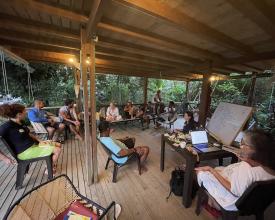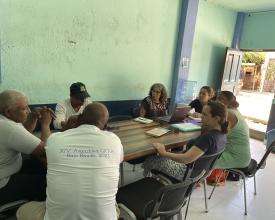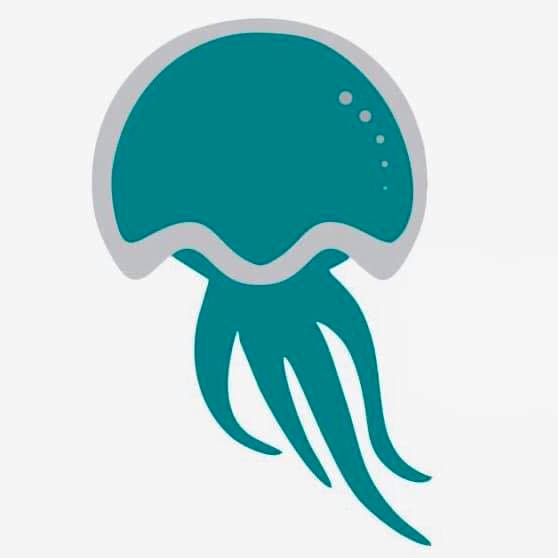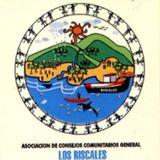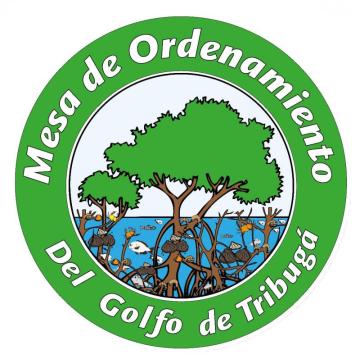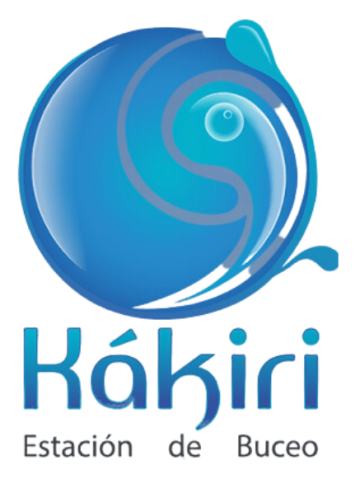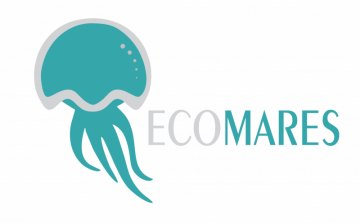
Managing ghost fishing in the Colombian Pacific with a community-based strategy

Fishing gear used around the world is sometimes abandoned, lost, or discarded at sea. It impacts marine life and the livelihoods of coastal communities that rely on healthy oceans and is called "ghost fishing gear".
The communities from the Gulf of Tribugá understand this problem and are collaborating with ECOMARES in the participatory design of a management strategy to prevent, mitigate, and remediate the damages caused by ghost fishing gear on biodiversity.
Fishers are identifying simple but effective measures to prevent or mitigate the loss of fishing gear. A local group is using diving as a tool to maintain rocky reefs and mangroves free from ghost fishing gear.
After cleaning events, the big challenge is to recycle the materials retrieved, and we are making progress thanks to the sum of efforts by different stakeholders, institutions, and project allies.
Improving communication between fishers and divers is another challenge.
Context
Challenges addressed
Environmental challenges:
- Rocky reefs are used as fishing grounds by artisanal fishers. The irregularity of the seafloor and the rapidly changing currents of this area cause the loss of fishing gear. It also affects cleaning operations that must be canceled if conditions are not adequate for diving.
Social challenges:
- There is no solid waste management system in this area, therefore we need to explore options to recycle the materials retrieved by the divers, and thus avoid bringing a new source of contamination to the land.
Economic challenges:
- The biggest challenge is to achieve self-sustainability for the management strategy and gradually reduce the dependance on external funding.
- Relative high costs of diving operations particularly due to the geographical isolation (no roads to Nuqui) and the steady increase of fuel cost in Colombia
Location
Process
Summary of the process
The agreement on management measures includes fishers' commitment to report ghost fishing gear to the scuba diving team trained locally. The ecological and social-ecological assessments contribute information to be considered in the agreement and warrant implementing the ghost gear management strategy. The financial sustainability assessment complements the agreement on management measures with a financial plan to put it into practice and facilitates synergies among different stakeholders.
Building Blocks
Agreement on management measures for ghost fishing
The purpose is to encourage fishers to actively prevent fishing gear loss and to report it when it happens. Fishers are invited to participate in interviews and workshops, where they share their experiences and ideas for solutions in the local context.
Enabling factors
- Fishers understand that their knowledge can help others fish more responsibly.
- Fishers are listened to and their views are respected.
- Fishers are aware of the importance of maintaining marine ecosystems in good conditions to sustain artisanal fisheries.
Lesson learned
The agreement must be based on a solid understanding of the causes and effects of ghost fishing in the local context.
Local leaders endorsement motivates fishers and the entire community to actively participate
Capacity building in scuba diving for coastal communities
The purpose is to improve the local capacity to safely remove ghost fishing gear from the sea. The existence of a permanent diving center in the area is mandatory to provide security during all aquatic activities of the training and cleaning campaigns.
Enabling factors
- Social cohesion and environmental awareness in the local community.
- A good relationship between the diving center and the native community.
- Transparent communication with community leaders along the implementation process.
Lesson learned
The response of the diving team should be rapid because currents change direction and can release and move the entangled fishing gear again. If the clean-up is delayed, the risk of not finding the gear increases.
Clear roles and efforts distribution among the diving and the on-land support team is essential to obtain the desired results and to communicate achievements back to the community, partners, and local authorities.
Ecological and social-ecological impact assessment
The purpose of this building block is to identify the impacts of ghost fishing both on the ecosystems and the people.
Rapid ecological assessments are used to establish a baseline of the impacts observed in two ecosystems: mangroves and rocky reefs, identified as key conservation priorities in the management plan of the regional protected area.
The social-ecological aspects of the problem require more time for data collection. Surveys of perception, in-depth interviews, and workshops are used to obtain information from the fishing and diving community about how the problem is happening in the area and its social and economic implications. The goal is to gain a deep understanding of the situations that lead to fishing gear abandonment, loss, or discard.
Enabling factors
- Community groups and individuals provide information, participate in data collection, and motivate others to participate.
- The data collection team spends enough time on data collection and triangulation of results.
- There is trust between the data collection team and the community, and the prior informed consent that protects personal information is discussed and observed.
Lesson learned
Rapid ecological assessments done by external experts must include:
- enough time for data collection
- time and commitment to return information to the community and participants
Financial sustainability assessment
The purpose of this block is to propose financial mechanisms to sustain ghost fishing gear surveillance and improve fishers' compliance with the management agreement. This is an economic analysis that helps to build a shared view of how the problem could be managed, how much that would cost in a certain period, and which funding options are available to the community, including potential income generation from the upcycling of ghost fishing gear and other marine debris.
Enabling factors
- The existence of active local groups in areas other than diving, like communication, recycling, and tourism. They can play a role in the functioning of the ghost fishing strategy.
Lesson learned
- It is important to approach a variety of potential allies in the public and private sectors to increase the chances of finding adequate support and commitment from stakeholders.
Impacts
The ghost fishing management strategy complements other local efforts to promote sustainable fishing practices in the Gulf of Tribugá.
The local communities now can participate in cleaning events in collaboration with professional divers. Eight people from five communities received training in scuba diving and ghost gear removal diving. They have conducted # cleanups in rocky reefs and # in mangrove estuaries, covering # hectares.
The group (@guardianesdelmargt) has retrieved # kg of solid waste, most of it, plastic. Lead weights recovered from the ghost fishing gear are being used to elaborate diving weights. Plastic materials from ropes and nets are being tested as potential raw materials for construction tiles by one of the project's allies.
At least 20% of the local fishers provided local ecological knowledge and suggested good practices to minimize the loss of fishing gear.
Beneficiaries
- Community Council Riscales Nuquí - ethnic local authority
- Artisanal fishers and their families
- Inhabitants of the Gulf of Tribugá
- Local and regional management authorities
Sustainable Development Goals
Story
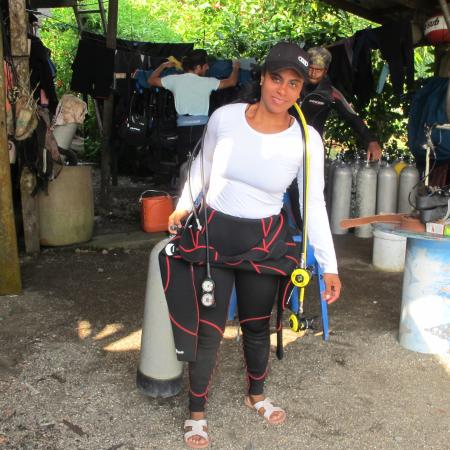
Meet Nelly Ibargüen, the first native woman diver from the Gulf of Tribugá. She learned about the project in a community meeting and did not hesitate to pose as a volunteer.
It was not easy for her to learn scuba diving but her motivation was strong. She is now a PADI-certified Ghost Gear Removal Diver.
On one occasion, Nelly said: "I used to support the construction of the industrial port in our estuary, but after diving there I changed my mind. Now I think that we must protect it".
She is now inspiring other women from her community.




